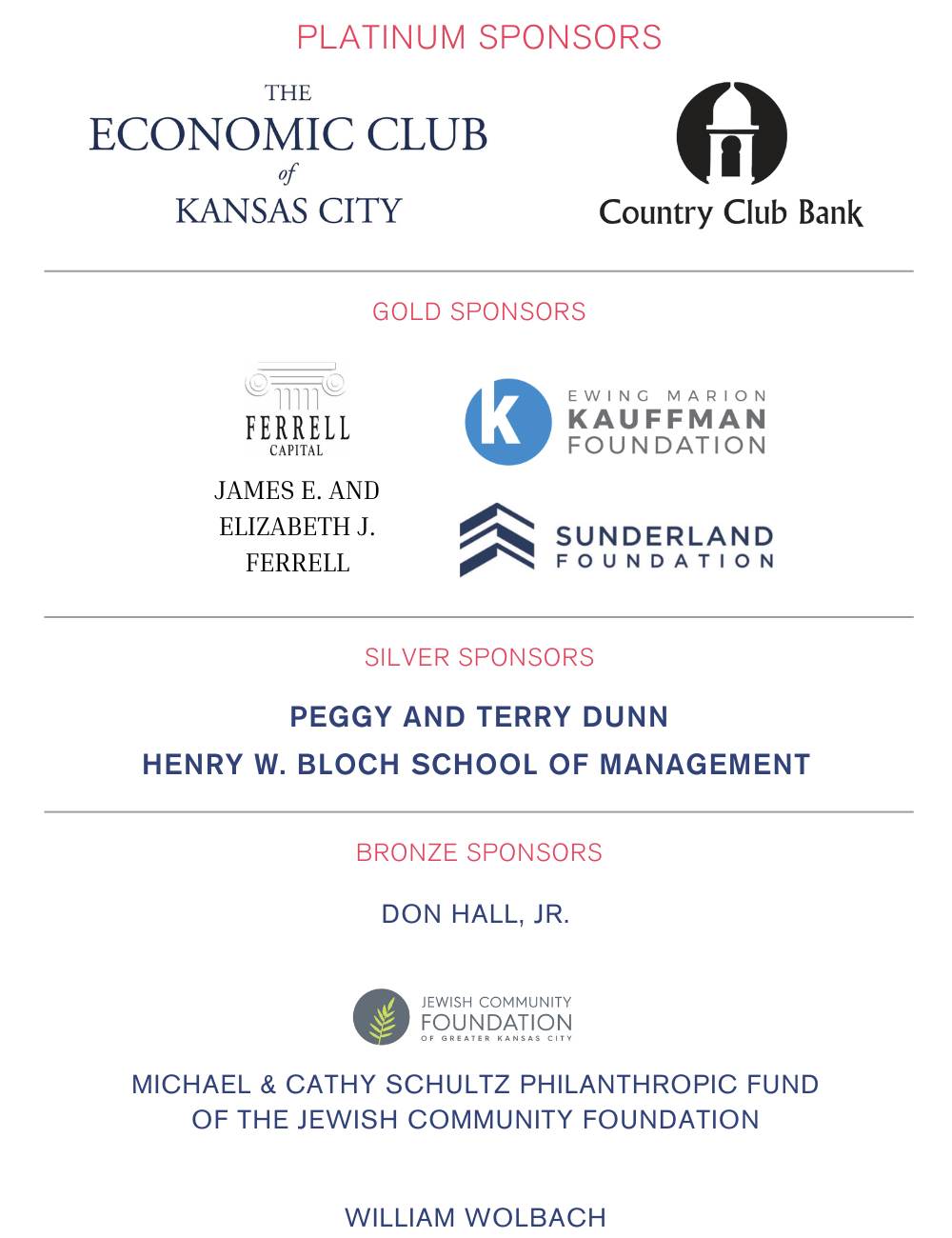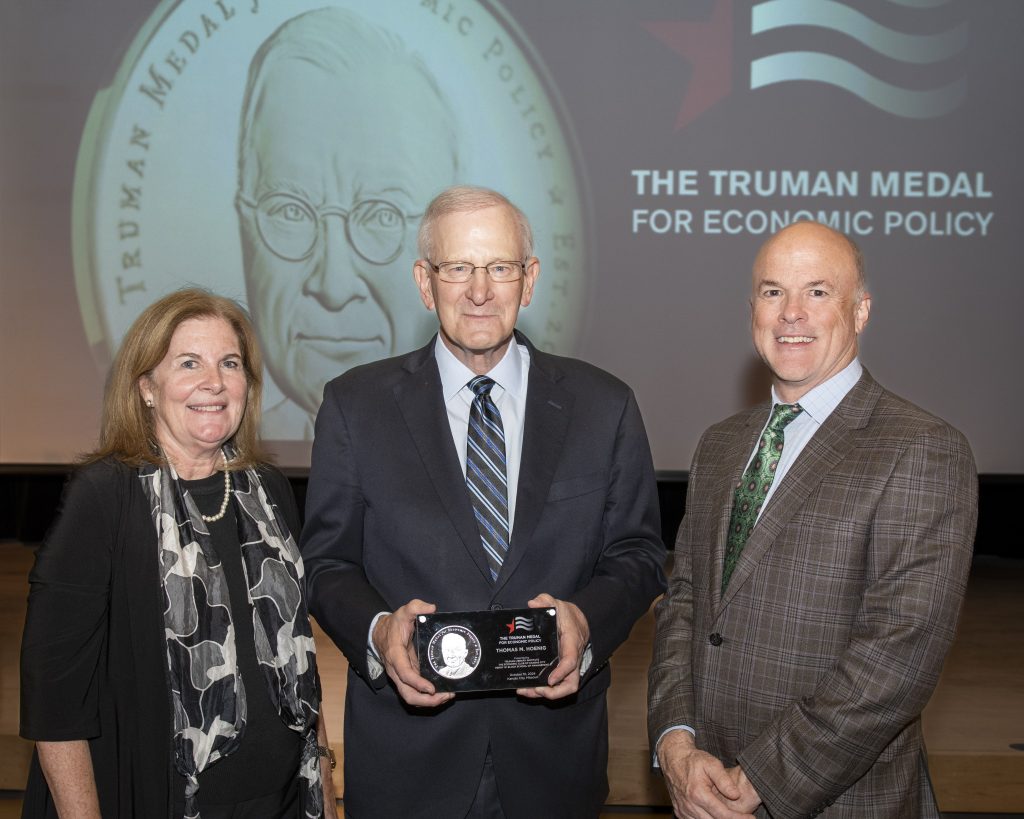2024 Truman Medal for Economic Policy
THURSDAY, OCTOBER 10, 2024
ONSTAGE & ONLINE: “THE COMPONENTS OF A RESILIENT ECONOMY”
6 p.m. Wine Reception | 6:30 p.m. Award Program
Truman Forum, Kansas City Public Library–Plaza Branch
4801 Main St. Kansas City, Missouri
ON OCTOBER 10, 2024, the Truman Library Institute honored Thomas M. Hoenig’s outstanding contributions to the fiscal health of our nation with the 2024 Truman Medal for Economic Policy.
Mr. Hoenig is a Distinguished Senior Fellow at the Mercatus Center. He became a director of the Federal Deposit Insurance Corporation (FDIC) in 2012 and served as vice chairman until 2018. From 1991 to 2011, he served as the eighth chief executive of the Tenth District Federal Reserve Bank in Kansas City, Missouri.
His acceptance remarks offer a timely and urgent call to commit ourselves to the requirements demanded by a resilient economy.
The Truman Medal for Economic Policy was created in 2005 to honor and celebrate the significant impact President Truman had on the American economic system by recognizing individuals who have made extraordinary contributions to the formation of economic policy. Past honorees include Alan Greenspan, Paul Volcker, Alice Rivlin, Janet Yellen and Roger W. Ferguson, Jr.
The Truman Medal for Economic Policy is jointly sponsored by the Truman Library Institute, the Henry W. Bloch School of Management, University of Missouri–Kansas City, and the Economic Club of Kansas City.
Thomas Hoenig, Honoree
THOMAS M. HOENIG, who served as president of the Federal Reserve Bank of Kansas City from 1991 to 2011, was the first president to rise through the ranks of the organization. He became well known for his views on the “too big to fail” issue and his dissenting votes on the Federal Open Market Committee in 2010.
Mr. Hoenig, the second of seven siblings, was born in Fort Madison, Iowa. The son of a plumbing contractor, he left Iowa in the mid-1960s to attend what was then called St. Benedict’s College in Atchison, Kansas, earning a bachelor’s degree in economics and mathematics from the school, which was later renamed Benedictine College. Plans for graduate school were delayed by the draft for the Vietnam War.
Once back in the states, Mr. Hoenig married Cynthia Stegeman and moved to Ames, Iowa, where he pursued a master’s degree, and later a doctorate, from Iowa State University. While visiting Kansas City in 1971, he saw a newspaper article about how the Kansas City Fed had created the Division of Bank Supervision and Structure that would conduct financial and competitive analysis on bank mergers. Two years later, Tom Hoenig applied for a job in the Division; he took the position, in part, because of his familiarity with the area but also because it was a unique opportunity that perfectly matched his interests.
When agricultural- and energy-related real estate values soared in the 1970s and 1980s, Mr. Hoenig, who was promoted to assistant vice president in 1979 and vice president in 1981, was working in supervision during one of the most tumultuous periods of the region’s financial history: the banking crisis of the 1980s. When real estate values tumbled in the collapse of a speculative bubble, Hoenig was heavily involved with cleaning up the resulting aftermath—a process that saw 350 banks in the Tenth Federal Reserve District either close or receive assistance.
Mr. Hoenig was promoted to senior vice president of Bank Supervision and Structure in 1986, and on August 13, 1991, the Bank announced Mr. Hoenig had been selected from a field of hundreds of applicants to succeed the retiring Roger Guffey as president. His first day on the job, October 1, 1991, he attended a meeting of the Federal Reserve’s monetary-policy-setting Federal Open Market Committee.
Under Mr. Hoenig’s leadership, the Bank engaged in one of the most significant projects in its nearly century-long history: the construction of a new headquarters building at 1 Memorial Drive. The 600,000-square-foot building was built on a prominent Kansas City hillside that, in recent years, had become something of a city eyesore as the site of the vacant St. Mary’s Hospital. The building opened in 2008.
In the aftermath of the 2007 recession, Mr. Hoenig was thrust upon a national stage as he spoke out frequently about the financial crisis and its causes, as well as the response to the crisis in terms of both regulatory changes and monetary policy.
He cast the lone dissenting vote against the FOMC’s easy money policies at each of the eight FOMC meetings in 2010 and was troubled by the FOMC’s stated promise of keeping the federal fund rates at a historic low for “an extended period.”
He also spoke out frequently about the large and systemically critical financial firms known as “too big to fail,” whose carelessness and mismanagement, he said, were a major cause of the crisis.
Following his retirement from the Bank in 2011, Mr. Hoenig, an Independent, was nominated by President Barack Obama and confirmed by the Senate as the Republican’s selection to serve as vice chairman of the bi-partisan board of the Federal Deposit Insurance Corporation (FDIC).
At the FDIC, Mr. Hoenig became one of the most influential vice chairmen in its history. In May 2014, American Banker noted that ‘…Hoenig is setting a new bar for how vocal an FDIC No. 2 can be.’ He was directly involved in reviewing and approving resolution plans submitted by the largest global banks required in the Dodd-Frank Act. His expertise in these areas is recognized throughout the world, and he is frequently asked to speak on matters of insurance pricing, bank resolution and financial stability. He developed an often-cited, understandable comparison of the measurement of core capital levels of the largest banking firms across the globe called the Global Capital Index.
Mr. Hoenig served on the Executive Committee for the International Association of Deposit Insurers (IADI) from 2012 to 2017 and was elected by its members to lead as its chairman in 2015. IADI is an association of deposit insurers—from more than 80 countries—who share the goal of improving deposit insurance systems through research, knowledge and technical assistance. IADI was instrumental in the successful development of a core set of international standards for deposit insurance systems. During his term on the FDIC board, he also served on the board of directors of NeighborWorks America, which was established by Congress to promote housing for low- and moderate-income families across America.
Mr. Hoenig is an accomplished writer and speaker. He has addressed audiences in North American, South America, Asia, Europe and the Middle East on topics which include economic leadership, strategic planning, monetary and economic policy, financial markets, and bank performance and supervision. Mr. Hoenig was a lecturer of Economics at the University of Missouri–Kansas City. He lectured at the People’s Bank of China on banking and bank supervision and on the role of markets in emerging economies. He is cited in several books and academic papers written about banking and financial markets and holds a Ph.D. from Iowa State University.
2024 Sponsor Salute

The Medal
The Truman Medal for Economic Policy was created in 2005 to recognize extraordinary achievement in the formation and conduct of economic policy. The Medal is given biennially at an awards ceremony in Kansas City, Missouri. The Truman Medal for Economic Policy reflects on the creation of the Council of Economic Advisers (CEA) under President Harry S. Truman. The CEA was established by the Employment Act of 1946, which President Truman signed on February 20, 1946. The act committed the government, as Truman described it, “to take any and all measures necessary for a healthy economy.”
Past Recipients
2005 Alan Greenspan
2007 George P. Shultz
2009 Paul A. Volcker
2011 Allan H. Meltzer
2013 Alice M. Rivlin
2015 John B. Taylor
2017 Robert J. Shiller
2019 Janet L. Yellen
2022 Roger W. Ferguson, Jr.
Click here to view the 2022 Event Album
Truman Medal Organizing Partners
Truman Library Institute
Economic Club of Kansas City
Henry W. Bloch School of Management
STAY IN TOUCH
Join our email list to receive news releases, digital history, event alerts and more, right in your inbox:


